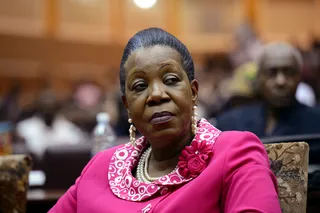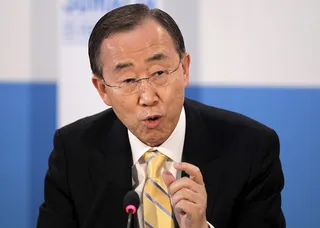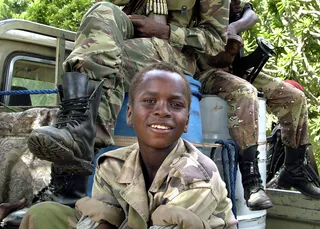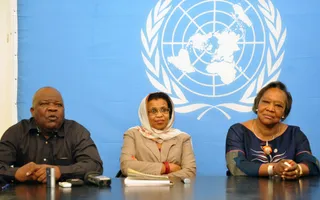Conflict in Central African Republic: Christian Militias Attack Fleeing Citizens
Christian militias attacked people fleeing the country.

1 / 28
Seleka Rebels Topple Government - It has been a little over a year since Seleka, the well-armed rebel movement, took over Bangui, the capital of CAR in March 2013. Since then conflict between Christians and Muslims in the country continues to leave the nation divided. Take a look at updates on the unrest. — Dominique Zonyéé (@DominiqueZonyee) and Naeesa Aziz (Photo: AP Photo/Ben Curtis, File)

2 / 28
Christian Militias Attack People Fleeing the Country - Christian militias attacked people trying to flee the country, according to a report from the UN refugee agency on April 11, 2014. Due to the heightening violence, 12,000 peacekeepers were approved to arrive in the Central African Republic by September. (Photo: AP Photo/Jerome Delay)

3 / 28
Looting Erupts in Bangui Capital - In Bangui, hundreds of Christians were looting and setting fire to homes and businesses owned by Muslims. Rwandan peace keepers and French forces rescued about 30 Muslims trapped inside their homes in the midst of the chaos on Jan. 22, 2014.(Photo: AP Photo/Jerome Delay)

4 / 28
Catherine Samba-Panza Sworn In Amid Looting - Catherine Samba-Panza was sworn in as the interim president of the Central African Republic on Jan. 23, 2014, as looting spread throughout the capital. She vowed to "safeguard the peace, strengthen national unity, ensure the wellbeing of the Central African people, and conscientiously fulfill ... work without any ethnic, regional or religious considerations." (Photo: Eric Feferberg/AFP/Getty Images)
Photo By Eric Feferberg/AFP/Getty Images

5 / 28
“Anarchy Is Over” - Despite the killings in January, interim President Alexandre-Ferdinand Nguendet said the conflict between Muslims and Christians in Central African Republic is over. The predominantly Christian country’s former Muslim President Michel Djotodia and Prime Minister Nicolas Tiengaye stepped down on Friday. During Djotodia’s term in office, thousands have been killed, with more than 1,000 deaths since last month. CAR has two weeks to search for a new leader.(Photo: AP Photo/Jerome Delay, File)
ADVERTISEMENT

6 / 28
The Calm After the Storm - It’s been almost a year since the rebel group Seleka took over the capital, Bangui. But after Michel Djotodia was forced to leave his post, more than 20 percent of the 4.6 million population who were displaced due to impeding violence are beginning to feel safe enough to leave their homes. (Photo: AP Photo/Rebecca Blackwell)

7 / 28
Who Are the Rebels? - The Seleka rebels are composed of fighters from three groups — Union of Democratic Forces for Unity, the Wa Kodro Salute Patriotic Convention and the Convention of Patriots for Justice and Peace — who have joined forces to launch a rebellion. Seleka means “alliance” in the local Sango language. (Photo: David Lewis /Landov)

8 / 28
What Do They Want? - Seleka accuses President Francois Bozizé of not honoring a 2007 ceasefire deal, which promised the release of political prisoners and payment for fighters who disarmed.However, the CAR government says that Seleka's ranks have been swelled by mercenaries from Sudan, Nigeria and Chad. (Photo: Feng Li/Getty Images)

9 / 28
Strong Words From Across the Water - As rebels laid siege to the presidential palace on March 24, the U.S. State Department issued a statement urging Seleka to re-establish law and order within Bangui and threatened that perpetrators of human rights abuses will be held accountable. (Photo: REUTERS/Ange Aboa)

10 / 28
Self-Made Man - Following the fall of Bozizé, Seleka rebel leader Michel Djotodia pledged to name a power-sharing government and declared himself president. (Photo: REUTER/Stringer)
ADVERTISEMENT

11 / 28
Bozizé on the Run - The Seleka rebel coalition resumed its fight against the Bozizé government on Thursday, March 21, 2013, and fighting quickly moved toward government stronghold Bangui. The rebels accused Bozizé of breaking a January peace deal to incorporate its fighters into the national army. In May, rebels overthrew the president and took over the palace. Officials say he fled to Cameroon. (Photo: AP Photo/Ben Curtis, File)

12 / 28
Seleka Suspends Constitution - One day after the coup, Djotodia declared that the country's constitution would be suspended. "I consider it necessary to suspend the November 27, 2004, constitution, to dissolve parliament as well as the government," he announced Tuesday. (Photo: AP Photo)

13 / 28
Peacekeepers Try to Maintain Order - Reports say members of the Central African Multinational Force (FOMAC) struggled to maintain order in Bangui as looters and gunmen roamed the streets. (Photo: REUTERS/Luc Gnago)

14 / 28
Zuma Saddened - Thirteen South African soldiers were killed and 27 others wounded in the fighting between rebels and government troops as Seleka battled for the capital. South African President Jacob Zuma sent the force to the Central African Republic to help Bozizé’s forces stave off the rebels. (Photo: Graham Crouch/Bloomberg via Getty Images)

15 / 28
African Union Suspends CAR - As news of the takeover broke, the African Union's Peace and Security Commissioner Ramtane Lamamra announced the body's decision to suspend the Central African Republic and order sanctions against the rebel leaders who captured the capital. (Photo: IVORYCOAST-CRISIS/AU REUTERS/Louafi Larbi)
ADVERTISEMENT

16 / 28
Prime Minister Tiangaye Takes the Reins - Although rebel leader Michel Djotodia will serve as interim president, the government will be led by Prime Minister Nicolas Tiangaye until elections are held in three years. After the fall of Bangui, Tiangaye imposed a curfew after residents reported widespread looting. (Photo: Xinhua/Claude Bernard Wongoue)

17 / 28
France Jumps Into Action - In light of the chaos, France sent an additional 300 troops to bolster its original force of 250 soldiers to ensure the security of its citizens and diplomats present in the country. Central African Republic is a former French colony. (Photo: AP Photo/Elise Foucaud, ECPAD)

18 / 28
Peace Reached - Before the takeover, Seleka rebels signed a formal ceasefire agreement on Jan. 11, 2013, after a round of peace talks in Gabon. The agreement was brokered by representatives from the Economic Community of Central African States.(Photo: AP Photo/Joel Bouopda Tatou)

19 / 28
Unity Government - Part of the deal reached in Gabon included the formation of a unity government. Just one week following the agreement, both sides were able to confirm Nicolas Tiangaye as the country's new prime minister.(Photo: AP Photo/Joel Bouopda Tatou)

20 / 28
U.N. Approves - U.N. Secretary-General Ban Ki-moon issued a statement welcoming the signing of agreements that halted the rebel advance on the country's capital."He urges the government of CAR, politico-military groups, the Seleka coalition and opposition parties to fully implement these agreements," a spokesperson said. (Photo: Matt Dunham/WPA Pool/Getty Images)
Photo By Photo: Matt Dunham/W
ADVERTISEMENT

21 / 28
Bozizé Stood Strong - After rebel forces announced they will temporarily lay down their arms in efforts to conduct peace talks with the CAR government, President Francois Bozizé announced that he will not leave power — rejecting a main demand of the group.Before the talks, rebel group Seleka had been on a steady march toward the country’s capital city of Bangui, where officials worried that the government might fall to the armed force.(Photo: Luc Gnago/REUTERS/LANDOV)

22 / 28
“Patriots” Stand Watch - Even in the wake of a unilateral ceasefire adopted by Seleka, supporters of President Francois Bozizé set up roadblocks in the capital in efforts to stop any eventual rebel incursion.Reports say the men building the barricades describe themselves as "patriots” and are stopping vehicles and questioning occupants in a search for rebels. (Photo: SIA KAMBOU/AFP/Getty Images)

23 / 28
Concern Over Child Soldiers - As the conflict lurched on, UNICEF has expressed concern over reports that a growing number of children are being recruited by armed groups in Central African Republic.The agency said it has received "credible reports that rebel groups and pro-government militias are increasingly recruiting and involving children in armed conflict." (Photo: REUTERS/Stephanie Hancock)
Photo By REUTERS/Stephanie Hancock

24 / 28
U.S. Leaves - Just before New Year's 2013, the United States ordered the evacuation of about 40 people, including the U.S. ambassador.U.S. Special Forces, who are assisting in the hunt for Joseph Kony, the fugitive rebel leader of another rebel group known as the Lord's Resistance Army, will remain in the country.(Photo: Ben Curtis / Associated Press)

25 / 28
How Did the CAR Government Respond? - President Francois Bozizé has asked for international help with containing the rebels and says that he is ready for peace talks, organized by regional leaders in Gabon, without conditions.The CAR army is unable to fight the rebels alone because it is historically underfunded and lacks equipment. (Photo: LUC GNAGO /LANDOV)
ADVERTISEMENT

26 / 28
African Force - An E.U.-funded regional force called the Central African Multinational Force (FOMAC) was deployed to the country and includes troops from concerned neighbors such as Gabon, Cameroon and Congo-Brazzaville. (Photo: Ben Curtis/AP Photo)

27 / 28
More Help - The U.N. Integrated Peace Building Office in Central African Republic (BINUCA) is also on the ground trying to encourage dialogue. (Photo: SIA KAMBOU/AFP/Getty Images)
Photo By Photo: SIA KAMBOU/AFP/Getty Images
